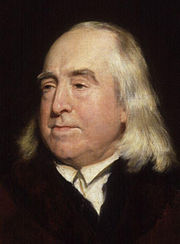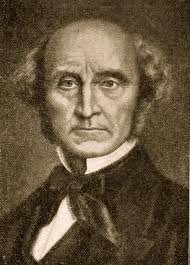Utilitarianism
At the outset of the nineteenth century, an influential group of British thinkers developed a set of basic principles for addressing social problems. Extrapolating from Hume’s emphasis on the natural human interest in utility, reformer Jeremy Bentham and John Stuart Mill proposed a straightforward quantification and qualification of morality by reference to utilitarian outcomes.
Jeremy Bentham

“Greatest Happiness of the greatest Number of people”
Jeremy Bentham’s moral theory was founded on the assumption that it is the consequences of human actions that count in evaluating their merit and that the kind of consequence that matters for human happiness is just the achievement of pleasure and avoidance of pain. He argued that the hedonistic value of any human action is easily calculated by considering how lasts, how certainly and how quickly it follows upon the performance of the action, and how likely it is to produce collateral benefits and avoid collateral harms. Taking such matters into account, we arrive at a net value of each action for any human being affected by it. And Bentham provides a hedonistic or ‘felicific’ calculus for this purpose, a criterion of utilitarian happiness. He had enumerated seven to estimate seven to estimate quantitavely the value of pleasure.
1. Intensity (How intense was the pleasure?)
2. Duration (How long was the pleasure?)
3. Certainly (Are you sure that what you experienced is pleasure?)
4. Propinquity (How remote was the experience of pleasure?)
5. Fecundity (Does it tend to produce further pleasurable sensations?)
6. Purity (It is free from or devoid of pain?)
7. Extent (How many people will experience the pleasure?)
All that remains, Bentham supposed, is to consider the extent of this pleasure, since the happiness of the community as a whole is nothing other than the sum of individual human interest. The principles of utility, then defines the meaning of moral obligation by reference to the greatest happiness of the greatest number of people who are affected by performance of an action. Similarly, Bentham supposed that social policies are properly evaluated in light of their effect on general well-being of the populations they involved. Punishing criminals is an effective by performance of an action. Punishing criminals is an effective way of deterring crime precisely because it pointedly alters the likely outcome of their actions, attaching the likelihood crime. Thus, punishment must "fit" the crime by changing the likely perception of the value of committing it. Download
John Stuart Mill

John Stuart Mill (1806-1873) profoundly influenced the shape of nineteenth century British thought and political discourse. His substantial corpus of works includes texts in logic, epistemology, economics, social and political philosophy, ethics, metaphysics, religion, and current affairs. Among his most well-known and significant are A System of Logic, Principles of Political Economy, On Liberty, Utilitarianism, The Subjection of Women, Three Essays on Religion, and his Autobiography. Mill’s education at the hands of his imposing father, James Mill, fostered both intellectual development (Greek at the age of three, Latin at eight) and a propensity towards reform. James Mill and Jeremy Bentham led the “Philosophic Radicals,” who advocated for rationalization of the law and legal institutions, universal male suffrage, the use of economic theory in political decision-making, and a politics oriented by human happiness rather than natural rights or conservatism. In his twenties, the younger Mill felt the influence of historicism, French social thought, and Romanticism, in the form of thinkers like Coleridge, the St. Simonians, Thomas Carlyle, Goethe, and Wordsworth. This led him to begin searching for a new philosophic radicalism that would be more sensitive to the limits on reform imposed by culture and history and would emphasize the cultivation of our humanity, including the cultivation of dispositions of feeling and imagination (something he thought had been lacking in his own education).
None of Mill’s major writings remain independent of his moral, political, and social agenda. Even the most abstract works, such as the System of Logic and his Examination of Sir William Hamilton’s Philosophy, serve polemical purposes in the fight against the German, or a priori, school otherwise called “intuitionism.” On Mill’s view, intuitionism needed to be defeated in the realms of logic, mathematics, and philosophy of mind if its pernicious effects in social and political discourse were to be mitigated.
In his writings, Mill argues for a number of controversial principles. He defends radical empiricism in logic and mathematics, suggesting that basic principles of logic and mathematics are generalizations from experience rather than known a priori. The principle of utility—that “actions are right in proportion as they tend to promote happiness; wrong as they tend to produce the reverse of happiness”—was the centerpiece of his ethical philosophy. On Liberty puts forward the “harm principle” that “the only purpose for which power can be rightfully exercised over any member of a civilized community, against his will, is to prevent harm to others.” In The Subjection of Women, he compares the legal status of women to the status of slaves and argues for equality in marriage and under the law. Download